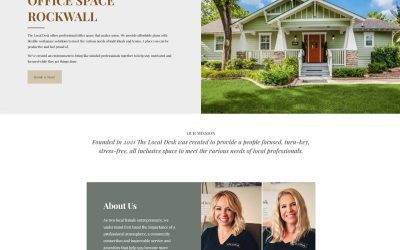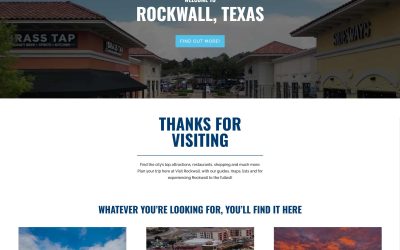
Entrepreneurship allows you to create your own schedule and work from wherever you’d like, which is why it’s such an attractive lifestyle. However, it takes careful planning and diligence to ensure your company succeeds.
Approximately 45% of companies fail within the first five years. This can occur for many reasons, but having an insufficient marketing strategy is one of the most common.
Using Google Ads can help take your company’s performance to the next level. Not everyone understands how to get started with Google advertising, though. Let’s explore how to maximize the ROI on each Google Ad you pay for.
Negative Keywords
These keywords prevent your ad from showing if a query contains a certain word or phrase. At first, this might seem like a counterproductive method for Google Ads management.
However, negative keywords are an amazing way to increase ad relevancy. For instance, let’s assume a company sells luxury women’s apparel. It could run ads that have the negative keywords “men” and “men’s” to ensure the wrong people don’t see the ad content.
Without negative keywords, you risk dealing with wasted clicks. You’ll essentially pay money to have people visit your website and immediately leave.
Single-Keyword Ad Groups
As the name implies, these are ad groups that involve only a single keyword. Most ad groups have a handful of keywords, and some have as many as 20+. The issue with multi-keyword ad groups is that it can be difficult to write ad copy that’s relevant to every keyword in the group.
This can inadvertently lead to poor ad relevance. This attribute heavily impacts your ad’s Quality Score.
Ads with higher Quality Scores will generally perform better than those with lower scores. Using a single-keyword group can help you eliminate this issue and keep your ad as relevant as possible.
This can also improve your ad’s readability. When you write for only a single keyword, it’s often much easier to create compelling ad copy.
Optimize Your Landing Pages
No matter how effective your ads are, they won’t mean much if you don’t optimize your landing pages. The content on your landing page should be relevant, scannable, and include a strong call to action (CTA).
Ensuring your landing page loads quickly is also essential. If your page takes more than a few seconds to load, it’s likely your users will navigate away.
Not only does this lead to wasted clicks, but users could also visit a competitor’s site instead. Check when people most frequently leave your landing page.
If they don’t make it to the bottom, your ad copy could be lackluster. If they scroll to your CTA but leave the page, the CTA itself could be uncompelling. There’s also a chance your offer isn’t enticing enough.
Understand Your Audience
Having a comprehensive understanding of your audience enables you to keep your ads relevant. There’s always more research to conduct on your target demographic, as trends change over time. Consider information like:
- Age
- Annual income
- Hobbies/interests
- Primary language
- Gender
- Level of education
These attributes will help you craft better Google Ads. By extension, this will help you maximize your ROI.
Dynamic Keyword Insertion
This is one of the most useful strategies you can utilize. Dynamic keyword insertion allows you to automatically use different keywords based on the user’s search query. Let’s look again at the aforementioned women’s luxury clothing example.
A business might have an ad group with keywords like “luxury women’s clothes,” “luxury women’s apparel,” and “designer clothes.” By using dynamic keyword insertion, its ads will change depending on which of these keywords their audience uses. So, two people might see the same ad with modified text based on their query.
Google Ads Extensions
Google offers various extensions that can improve your ad visibility. They can also provide additional information about your users. One of the most prominent types is location extensions.
These help people determine your company’s location. Online companies can still benefit from using these extensions, as having a physical address helps your company appear more legitimate. You can also use image extensions to complement your ads with visuals.
Split Testing
Also known as A/B testing, split testing will help you determine the most effective Google ads. This process involves running multiple ads with minor differences. A great example is running three ads that have the same images but different CTAs.
You can then check your analytics to determine which ad was most effective. Having a small variance in performance is normal.
Keep an eye out for large differences between ads, though. This allows you to eliminate strategies that don’t work and emphasize those that do.
Work With a Professional
Hiring a professional is one of the most efficient ways to boost your Google Ads ROI. A reputable Google Ads agency can take your performance to the next level and help you avoid common pitfalls. When looking for someone to work with, see what their past clients have to say.
There should be no shortage of positive feedback about the stellar experiences they had. It’s best to prioritize businesses that often work with companies like yours. This ensures they’ll understand your campaign’s nuances.
You should also look for companies that proudly display their past projects. Ask about their pricing structure before you make your choice.
The last thing you want is to encounter financial surprises. A bit of online research goes a long way toward finding the best company for your situation.
Never Neglect Google Ads
Leveraging Google Ads can be one of the best marketing strategies you can implement. As long as you understand how to get the most out of your efforts, you’ll hit target metrics like never before. Do your due diligence when searching for a professional to work with so you can get the best results.
At Key Element Media, we’ve strived to exceed each of our client’s expectations since 2003. We also serve our community in various ways, including volunteering and donating to local organizations. Reach out to us today to learn more about how we can help.




